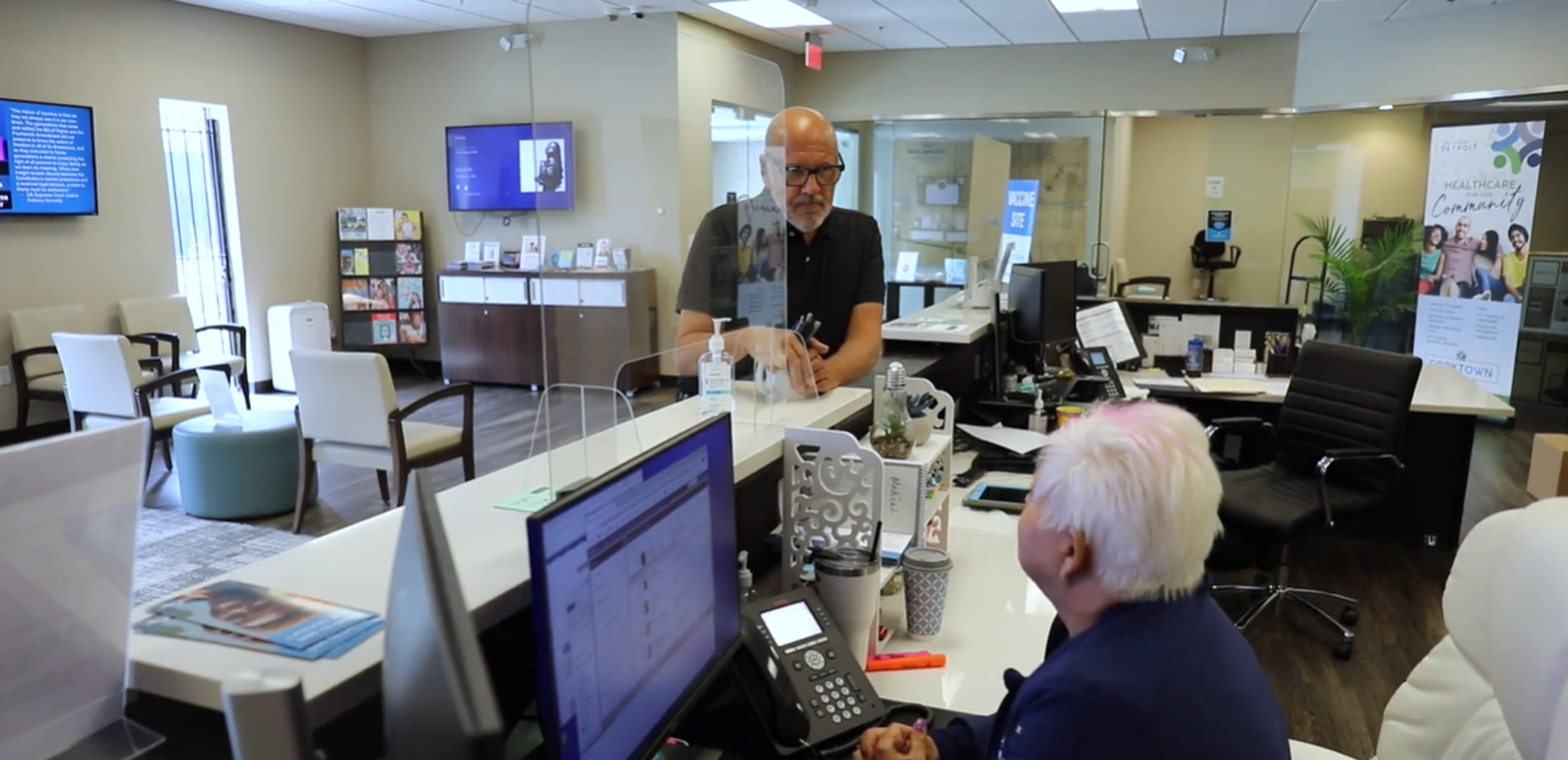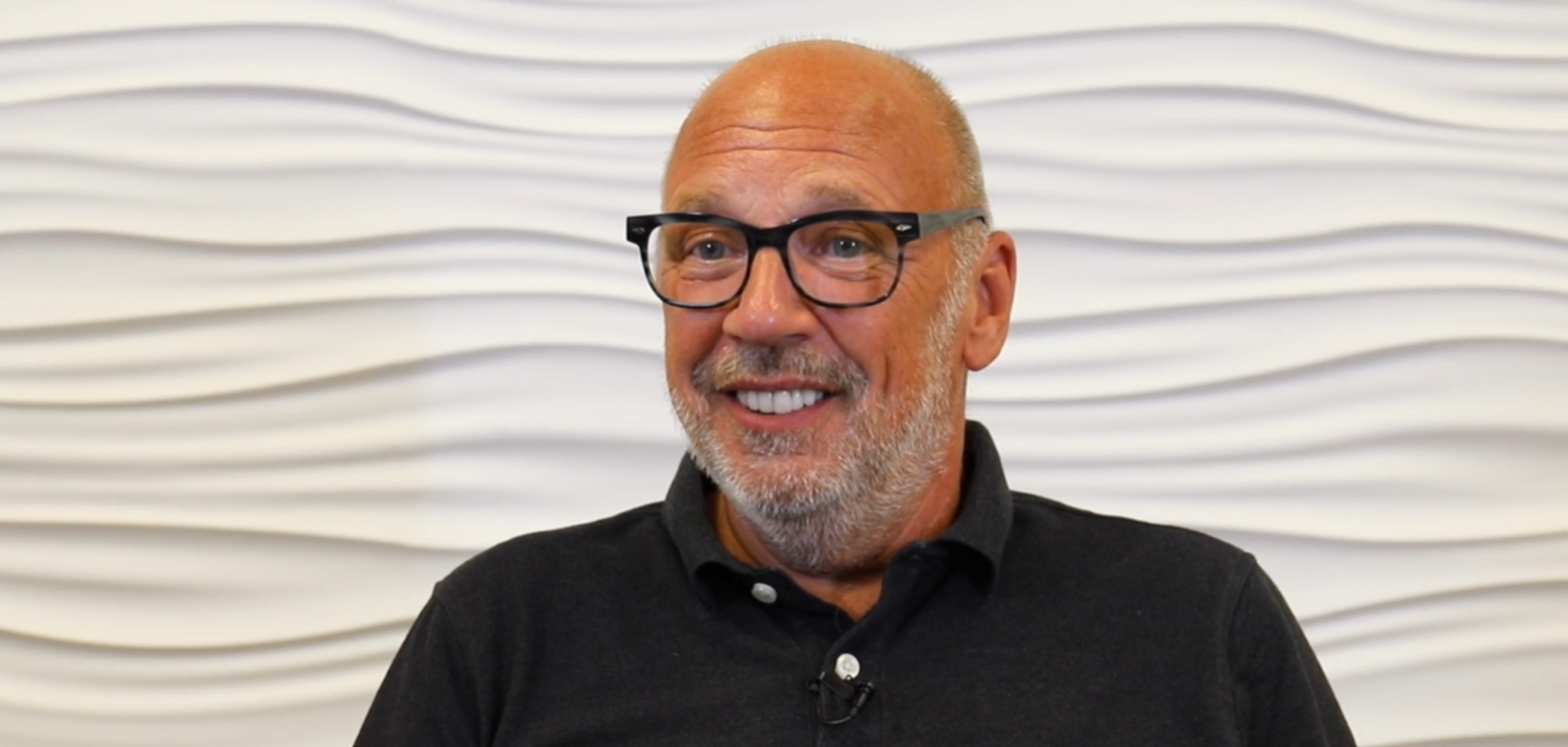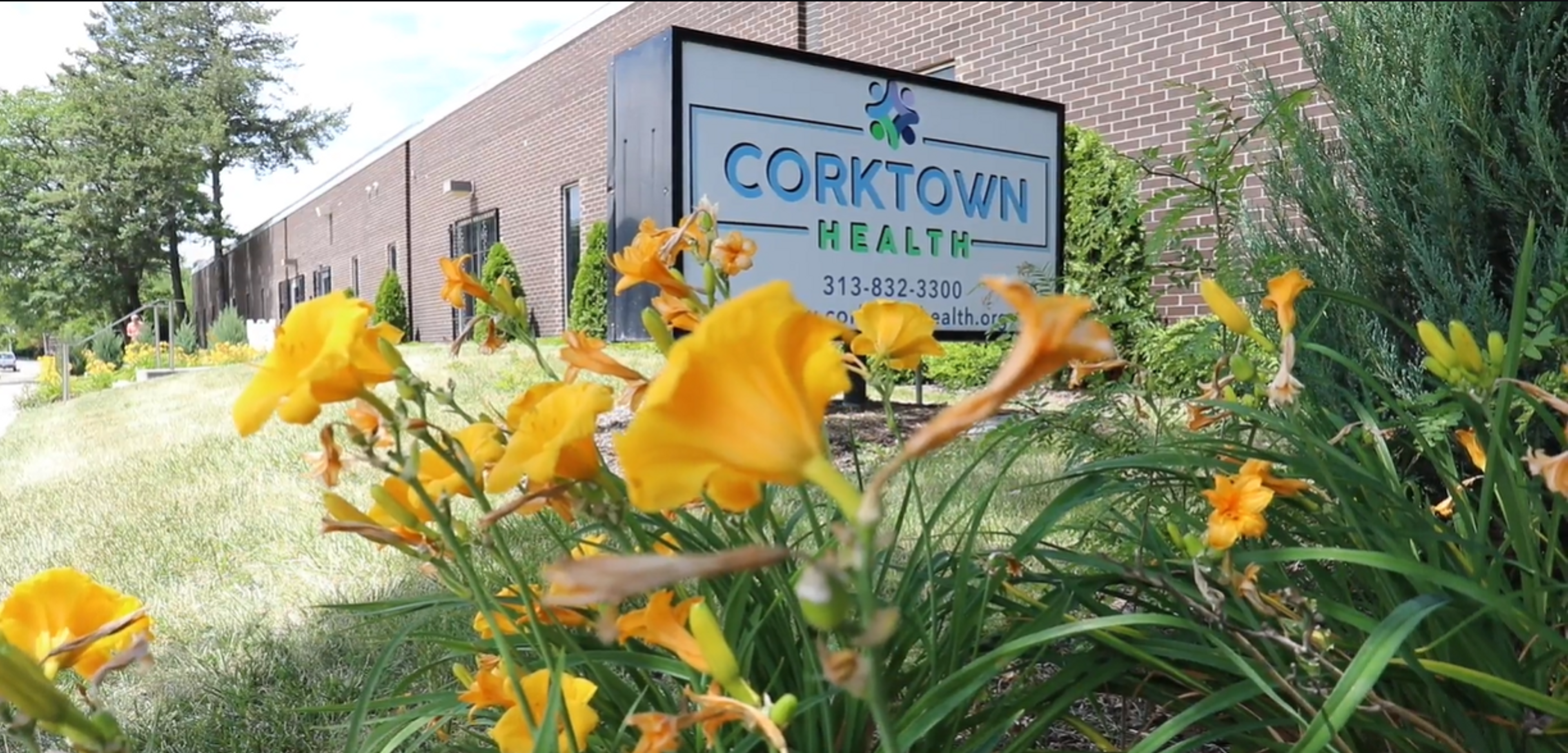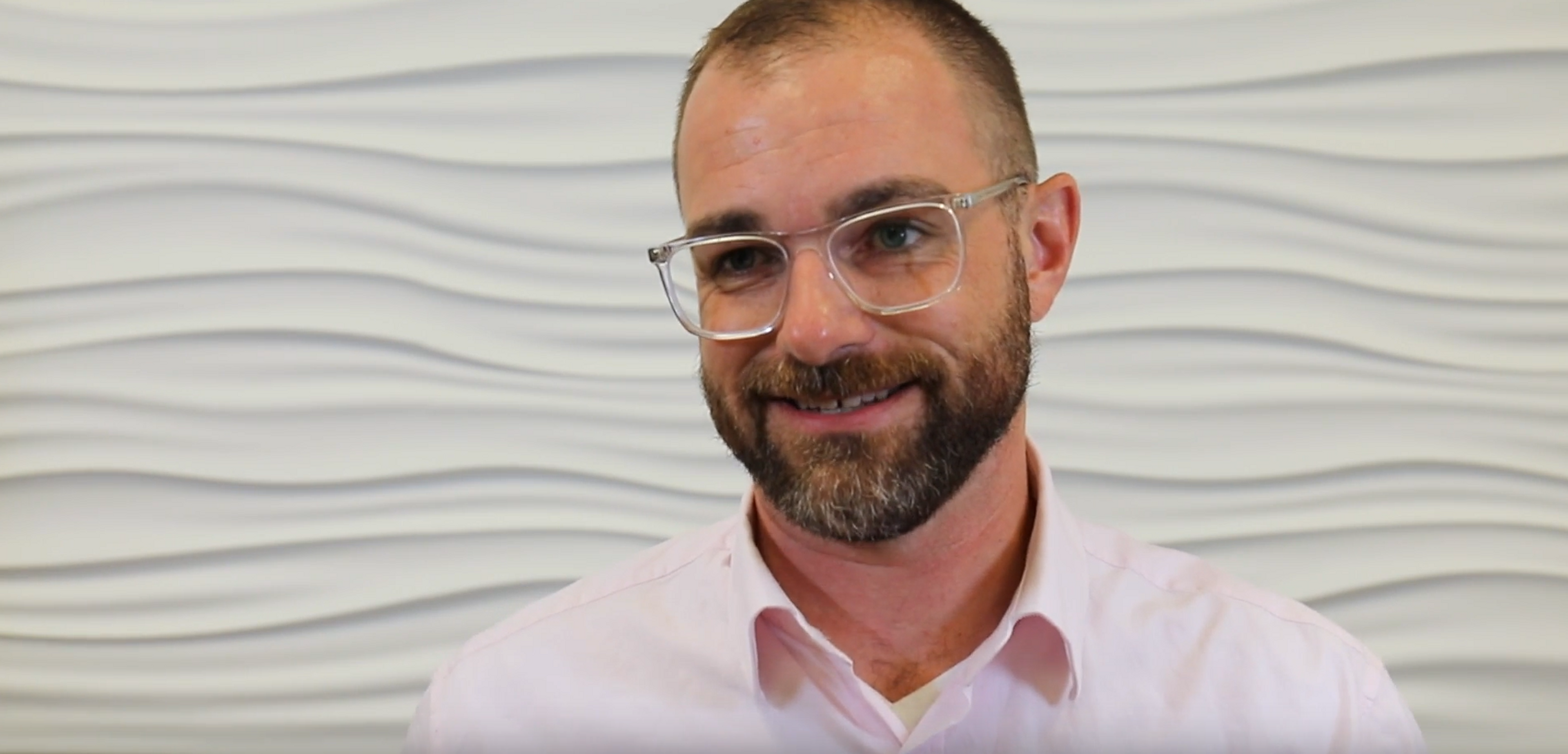LGBTQ-Affirming Corktown Health Center Invites Patients to Be Themselves
Amy Barczy
| 5 min read
Amy Barczy is a former brand journalist who authored content at Blue Cross Blue Shield of Michigan. Prior to her time at Blue Cross from 2019-2024, she was a statewide news reporter for MLive.com. She has a decade of storytelling experience in local news media markets including Lansing, Grand Rapids, Holland, Ann Arbor and Port Huron.

Peter Eichler walked in the door to Corktown Health in Detroit for the first time in 2018 and braced himself. It was all too common to get stares and tension from staff at a doctor’s office.
What happened next changed everything – and it started with the front desk staff at Corktown Health.
“You’re greeted, there’s a conversation – you don’t feel like just another patient. You feel like the human that you are,” said Eichler, who is a Blue Cross Blue Shield of Michigan member. “The staff don’t stare at me. They don’t question who I am; they are empathetic to stories that are outside of the heteronormative space.”
After Eichler next met with his new doctor, he could tell she helped set the tone for LGBTQ+ affirming care at Corktown Health.
“She walks in, she sits down, she introduced herself, and that her preferred pronouns are ‘she’ and ‘her,’ and she asks me what my name was, and what my preferred pronouns are,” Eichler said. “That just floored me. In the mainstream culture, the context of someone’s identity through pronouns really hadn’t gained a ton of traction at the time and wasn’t a part of the conversation.”
Corktown Health is Michigan’s first nonprofit LGBTQ-focused medical home, located in Detroit’s Corktown neighborhood just west of downtown. Since its opening in 2017, it has helped more than 4,000 patients. Corktown Health grew out of a 30-year-old agency, Health Emergency Lifeline Programs, that was started in the mid-1980s to respond to the emergency of HIV and AIDS.
Today, Corktown Health offers comprehensive primary care to the community in Southeast Michigan, with a specific focus on providing a safe environment for the queer community. The clinic offers primary care, geriatric care, cancer screening, HIV treatment and STI treatment, as well as vaccines and other public health measures.
“Not a lot of medical providers make themselves known as a LGBT-affirming provider to the community – they don’t advertise, they don’t do things to advertise themselves in that regard – we do,” said Patrick Yankee, chief development officer at Corktown Health. “We take a very deliberate stance in who we want to be our patients, to serve this community as a priority (but not exclusively).”

Blue Cross support for Corktown Health
Corktown Health’s connection to Blue Cross Blue Shield of Michigan started when the organization launched in 2017, as funding from Blue Cross helped to hire Corktown Health’s first medical director.
“The partnership with Blue Cross Blue Shield of Michigan is absolutely critical to our founding and to the earliest phase of our development here,” Yankee said. “As leaders in the health space in Michigan, they are critical partners to have.”
Blue Cross continues to support Corktown Health with annual funding through the Strengthening the Safety Net program.

“Every day, the providers and staff at Corktown Health are removing barriers to health care for individuals in the gay, lesbian and transgender community in southeast Michigan – whether it’s helping someone enroll in health insurance or prescribing treatment,” said Ken Hayward, vice president and special assistant to the president for Community Relations at Blue Cross. “Blue Cross is proud to continue to support Corktown Health in its mission to provide inclusive care.”
Corktown Health recently launched the Corktown Health Institute as a way to help health care providers, organizations and municipalities advance equitable LGBTQ+ health care practices in Michigan. Blue Cross was among the early funders of this program, which seeks to expand education and training for providers and organizations. Some of its first actions include developing online programs on LGBTQ+ affirming care, offering training to providers and compiling a directory of LGBTQ+ affirming providers in Michigan.
‘Visibility leads to accessibility’
In 2016, the National Institute on Minority Health and Health Disparities identified the LGBTQ+ community as a "health disparity population" because of challenges within the community in both accessing care and using health services. For example, many in the LGBTQ+ community experience discrimination in health care settings and do not feel comfortable or safe sharing gender or sexual orientation with health care provider. This can keep many LGBTQ+ individuals from seeking help for their mental or physical health.
“A lot of people have bad experiences or past experiences that may have kept them out of health care. It could have been a weird question from a clinician like a doctor or a nurse, but it also could be another provider – it could be a phlebotomist in the office who draws your blood, or a clerk, or someone else in the office during that visit,” Yankee said. “Health care can be scary for a lot of reasons, for a lot of people. Many people find that experience very uncomfortable.”
Corktown Health strives to create an environment where patients don’t have to hide or try and conceal parts of their lives from their providers – by offering a judgement-free, empathetic experience where patients are free to be themselves.
“We don’t expect our patients to be heterosexual. I think a lot of times, many people do (expect that),” Yankee said. “I think a lot of people come to a provider and not reveal their whole selves. We invite patients to do that and I think that’s very noticeable for people.”

For Eichler, his plan through Blue Cross Blue Shield of Michigan helps him continue to access the health care and services he needs.
“It’s an easy network to participate in, the user interface is so simple to be able to navigate and I can get to resources fairly quickly,” Eichler said. “And whenever there’s a problem, the customer service is quite effective and able to engage at different touchpoints. All of those factors keep me coming back to the network. It’s a robust network, which means I don’t have to compromise who I go to see just because of my insurance provider, which is just another level of comfort.”
To Eichler and many other patients, Corktown Health is more than a great doctor’s office with personable staff. It offers visibility for a marginalized community within a system that has not always been affirming.
“Corktown Health is important to the queer community for the fact that it exists,” Eichler said. “It provides a visibility: we exist, we see you. Visibility leads to accessibility.”
Photo credits: Blue Cross Blue Shield of Michigan





